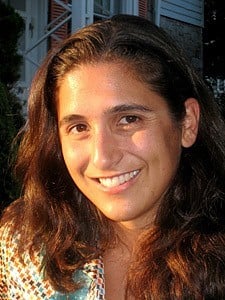Parshat Vayetze is the site of Jacob’s emergence into adulthood. He has left behind his parents’ home in search of his own family and fortune and, by parshah’s end, Jacob is heavy with both. It is in this interlude of maturation that we are offered precious insight into the interior force that propels our artful, striving patriarch. Jacob here gives name to that force—a name used only by him, and only here—to invoke his strange and idiosyncratic experience of God.
The young patriarch’s God is heralded not with honorifics, nor extolled with superlatives. This God is barely recognizable as the one with which Jacob’s grandfather was intimate—that external force, commanding and commandeering from above, an entity at once independent and solicitous of humankind. This is not Elohim nor El-Shaddai; not YHWH nor Adonai. This is, instead, Pachad Yitzchak, the Terror of Isaac.
The provenance of this peculiar Being is achingly transparent. Jacob would have seen this force haunting his father’s dim eyes, ransacking his fitful sleep, harassing his addled mind. Powerful and abiding above all else was this terror, refusing to release the damaged Isaac from the horror of his father’s almost-act and its outlandishly cruel explanation. Isaac knew God from what he saw as a boy. God was fear: unmediated, uncompromising fear; fear from which there was no comfort, nor any promise of it. This was the Terror of Isaac.[1]
Jacob carried fear’s weight with him to Paddan-Aram. After Jacob spirited away his family and flocks from the household of his father-in-law, Laban pursued and overtook the fugitive family, accusing Jacob of robbing him blind. It was in this confrontation that Jacob invoked his personal God. Fiercely denying his own fault, Jacob insisted that, had it not been for “the God of my father—the God of Abraham and the Terror of Isaac,”[2] Laban would have cheated him out of all that was his due. When Laban and Jacob then sealed their cool peace with a vow, Jacob did not join Laban in invoking the “God of their father,” the “God of Abraham and the God of Nahor.” He swore pointedly instead to “the Terror of his father Isaac.”[3]
In Jacob’s vow one can hear the reverence for the crushing force that hovered over his childhood. One can hear the deference paid to fear’s power—the acknowledgment of how it can shape and break a man, and hold him always in its thrall. But one can also hear how a man may hew power from fear. One can hear how a childhood spent in witness to the Divine Terror could have fortified Jacob for his encounter with Laban, allowing him—in a moment of extreme vulnerability—to slough off the threat and bluster of his belligerent father-in-law.
Such was the canny mettle of our patriarch that, though it was his inheritance, terror did not possess Jacob. He gave it its due, paying obeisance to the formative power of its grip. But Jacob was not a fearful man. He was, on the contrary, a wily negotiator, a conniving manipulator; a man who bargains and wrestles with God—and wins.
And perhaps it was precisely because Jacob grew up in the shadow of Isaac’s Terror that he was able to best it. Jacob knew that fear was his to inherit, but he chose instead to transform it into something that supported and buffeted him—something by which he could, literally, swear. From fear, he learned that the world was hard and often cruel, and that it demanded from those who would thrive in it a certain gall, tenacity and cunning. And, from his own experience of the Terror of Isaac, he learned that fear could mutate into its own kind of power that can embolden and fortify the vulnerable.
As it was for Jacob, fear is a part of our inheritance. The spasms of terror that have visited our fathers and theirs before them have shaped how we understand our history and how we inhabit our identity as the Children of Israel. The ages, as we have internalized them, have too often been pointedly cruel to us, and our current lives of relative security, prosperity and freedom can temper, but not erase, this legacy.
But such a legacy can too often mean that fear is venerated and our relationship to it protected, held close, even cultivated. In practice, this can translate into a reflexive focus inward, a preoccupation with our own needs to the exclusion of others’. Fear is like that: It fixes one in place, limits one’s world and constricts one’s scope of vision.
But, like Jacob, we need not be beholden to the fear of our fathers. And, from our patriarch, we know that fear—even, or perhaps especially, in moments of vulnerability—can be transformed into a kind of power. We can swear by the Terror of our Fathers that we will help others transform the terror that visits them into strength. We can vow by this formidable force that we will not abide a world in which violence, intolerance, hatred and ignorance prey upon its inhabitants as they have our own people. From Jacob we know that fear must be given its due, but that it also can—and must—be overcome.
[1] I use here Robert Alter’s translation of Pachad Yitzchak, more commonly translated as “The Fear of Isaac.” See Robert Alter, The Five Books of Moses (New York: W.W. Norton & Co., 2004) 174–5, fn. 53.
[2] Genesis 31:42.
[3] Genesis 31:53.

